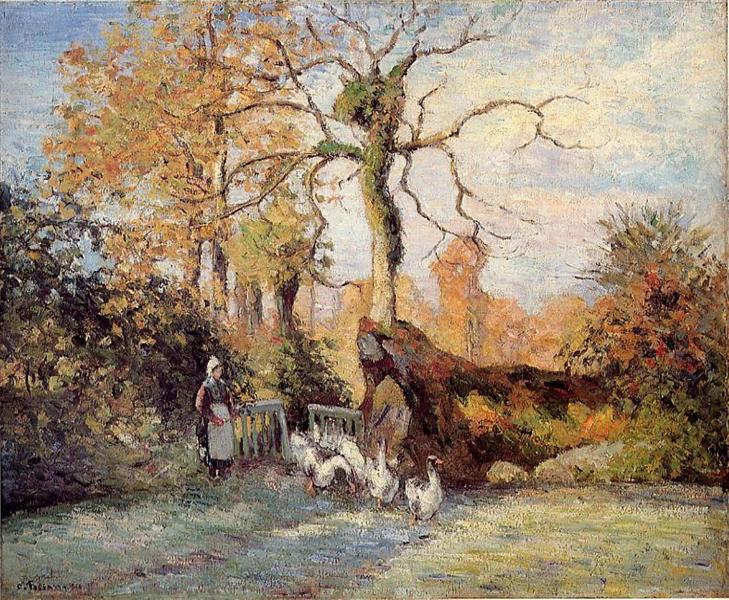Description
The painting "The Goose Girl at Montfoucault - White Frost" by Camille Pissarro, painted in 1875, is part of the period when the artist delves deeply into the style of impressionism, although it still retains elements of the realism that preceded it. In this work, Pissarro masterfully captures the essence of rural life, while reflecting on the intimacy of nature in an everyday scene.
In the foreground, a young female figure stands prominently. This girl, in charge of herding geese, is the center of the composition. Clad in simple attire that reflects the peasant dress of the period, her presence is enhanced by a deep sense of solitude and connection to her surroundings. The young girl's relaxed, yet alert, posture evokes both the hard work of rural life and a calm resignation to her daily responsibilities. Pissarro's choice to depict this singular figure in a vast setting is a visual statement that emphasizes the relationship between the individual and the vastness of nature.
The landscape surrounding the girl is an explosion of subtle colours. Pissarro uses a cool colour scheme, where greys, blues and whites predominate, evoking the morning frost that gives the work its title. The frozen atmosphere, with a halo of dim light, creates an evocative mood, reflecting the cold and, at the same time, the beauty of a winter day. The impressionist technique is evident in the loose brushstrokes that lend an almost ethereal quality to the atmosphere, infusing the scene with life while retaining a focus on serenity.
The background of the work includes fields that stretch to the horizon, a characteristic representation of the French countryside that obsessed Pissarro and other Impressionists. It is interesting to note that, although the painter captures the present moment, he does so through a nostalgic lens, recalling the passing of a simpler time and the union of man with nature. This duality—a sense of calm and the imminent arrival of winter—translates into a visual experience that invites contemplation.
When examining "The Goose Girl at Montfoucault - White Frost", it becomes clear that Pissarro is not only seeking to portray the human figure, but is also using its presence to communicate a broader message about rural life and the dignity of humble jobs. This work is a perfect example of how, through a simple everyday act, profound themes of existence can be explored.
Pissarro's work, when compared to other contemporary works of his time, demonstrates a unique ability to combine naturalistic observation with a sense of personal interpretation. Like other Impressionist artists, he shared the intention of capturing light and changing hues; however, his focus on everyday life, on the souls that inhabit the countryside, presents a singularity that accentuates the humanity behind each scene.
Pissarro has been less appreciated compared to some of his contemporaries, but his influence on the development of Impressionism is undeniable. With works such as "The Goose Girl At Montfoucault - White Frost", he offers us a glimpse not only into 19th century rural life, but also into the humanity that sustains it, holding up a mirror that reflects the fragility and beauty of the fleeting moments that make up our existence. Through his work, Pissarro does not simply present us with an image, but tells us stories of lives lived with simplicity and dignity, evoking a deep connection with the viewer.
KUADROS ©, a famous painting on your wall.
Hand-made oil painting reproductions, with the quality of professional artists and the distinctive seal of KUADROS ©.
Painting reproduction service with satisfaction guarantee. If you are not completely satisfied with the replica of your painting, we will refund 100% of your money.

